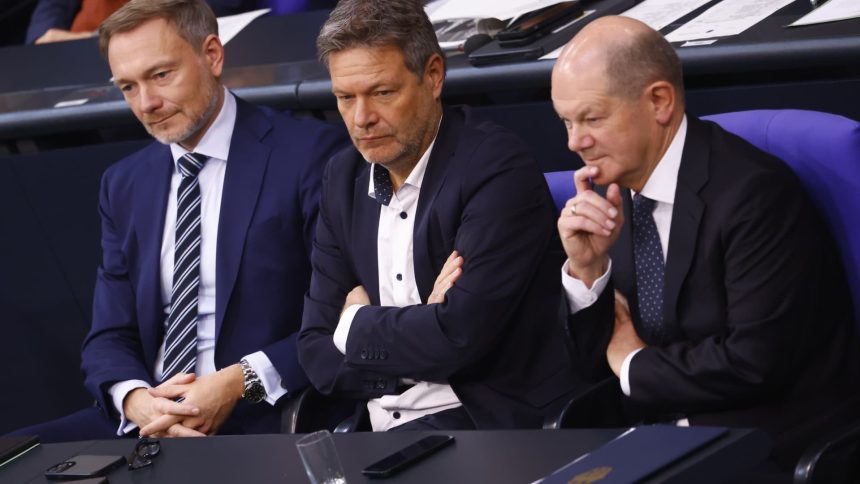Germany’s government has reached a deal on its 2024 budget and will keep current debt restrictions into next year following weeks of tense negotiations, leadership coalition partners announced Wednesday.
The government is expected to save 17 billion euros ($18.33 billion) in its core budget by ending climate-damaging subsidies and cost cutting, Chancellor Olaf Scholz said in a press conference on Wednesday.
“Prioritizing means figuring out what we can afford and what we can’t, together. It is also about cuts and savings. We don’t like doing those, of course, but they are necessary,” Scholz said.
Germany will also cut spending from its climate and transformation fund, which was at the core of negotiations.
Scholz added that the government was sticking to its goals, including supporting Ukraine, pushing ahead with Germany’s green transformation and strengthening social cohesion.
“These three goals lead us in an unchanged manner. But it is clear that we need to manage reaching them with significantly less money,” Scholz said, adding that the government will also preserve its debt brake, first enacted in 2009.
The brake caps the amount of government debt and limits the country’s structural budget deficit. It can only be suspended in emergency situations, such as the Covid-19 pandemic.
Budgetary tensions erupted in November after Germany’s constitutional court ruled that the government’s plans to re-allocate unused emergency debt taken on during the Covid-19 pandemic to its current budget was unlawful.
On Wednesday, Scholz said that the ruling would not only impact the current and upcoming budget, but also how further budgets will be created and set up.
The decision ripped a hole worth around 17 billion euros into the national budget for 2024, forcing coalition partners to reassess their plans and raising questions about economic policy cornerstones, including the debt brake.
Political divisions have encumbered and prolonged deal negotiations. German economic research institute IW on Wednesday said that it expects the country’s gross domestic product to contract by 0.5% next year, citing the the budget crisis and related uncertainty about finances as one of the key factors.
German finance minister Christian Lindner, who is part of the Free Democratic Party, has been intent on sticking to the debt brake.
Social democrat Chancellor Olaf Scholz and Green party Economy Minister Robert Habeck have advocated for another suspension of the debt brake, citing the ability to maintain policies around benefits and to pursue a green transition of the economy.
Despite recent hurdles, the leadership alliance is functional, Lindner stressed during the Wednesday press conference.
“This coalition is capable of taking action and agreeing even when it comes to very difficult tasks.”
The budget agreement must now be discussed by the parliamentary budget committee, before it gets passed on for review to the parliament, then to the Bundesrat council that represents Germany’s sixteen states federally.
A temporary budget will be in place to tide the process over, which will allow for vital administration and legal expenses.
“It is very good news I would say that the government has reached a deal, and has reached a deal still this year, which will almost certainly mean that households and companies will have much more certainty as to what is going to happen next year especially with energy support matters,” Holger Schmieding, chief economist at Berenberg, told CNBC’s “Squawk Box Europe” on Wednesday, before the deal was announced.
Read the full article here




